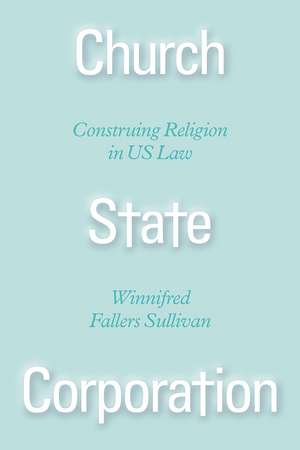Church State Corporation: Construing Religion in US Law
Autor Winnifred Fallers Sullivanen Limba Engleză Paperback – 28 sep 2020
Through readings of the opinions of the US Supreme Court and other legal texts, Sullivan shows how “the church” as a religious collective is granted special privilege in US law. In-depth analyses of Hosanna-Tabor v. EEOC and Burwell v. Hobby Lobby reveal that the law tends to honor the religious rights of the group—whether in the form of a church, as in Hosanna-Tabor, or in corporate form, as in Hobby Lobby—over the rights of the individual, offering corporate religious entities an autonomy denied to their respective members. In discussing the various communities that construct the “church-shaped space” in American law, Sullivan also delves into disputes over church property, the legal exploitation of the black church in the criminal justice system, and the recent case of Masterpiece Cakeshop v. Colorado Civil Rights Commission. Brimming with insight, Church State Corporation provocatively challenges our most basic beliefs about the ties between religion and law in ostensibly secular democracies.
Preț: 149.80 lei
Preț vechi: 184.45 lei
-19% Nou
Puncte Express: 225
Preț estimativ în valută:
28.67€ • 29.62$ • 23.86£
28.67€ • 29.62$ • 23.86£
Carte indisponibilă temporar
Doresc să fiu notificat când acest titlu va fi disponibil:
Se trimite...
Preluare comenzi: 021 569.72.76
Specificații
ISBN-13: 9780226454696
ISBN-10: 022645469X
Pagini: 192
Ilustrații: 4 halftones
Dimensiuni: 152 x 229 x 15 mm
Greutate: 0.34 kg
Ediția:First Edition
Editura: University of Chicago Press
Colecția University of Chicago Press
ISBN-10: 022645469X
Pagini: 192
Ilustrații: 4 halftones
Dimensiuni: 152 x 229 x 15 mm
Greutate: 0.34 kg
Ediția:First Edition
Editura: University of Chicago Press
Colecția University of Chicago Press
Notă biografică
Winnifred Fallers Sullivan is provost professor in the department of religious studies, director of the Center for Religion and the Human, and affiliate professor of law at Indiana University Bloomington. She is the author, coauthor, or coeditor of multiple books, including, most recently, Ekklesia: Three Inquiries in Church and State; Politics of Religious Freedom; and A Ministry of Presence: Chaplaincy, Spiritual Care, and the Law, all published by the University of Chicago Press.
Cuprins
Note on Capitalization
Note to European Readers
Note to European Readers
Introduction. The Definite Article
Chapter 1. The Church Makes an Appearance: Hosanna-Tabor v. EEOC
Chapter 2. “The Mother of Religion”: The Church Property Cases
Chapter 3. Hobby Lobby: The Church, the State, and the Corporation
Chapter 4. The Body of Christ in Blackface
Conclusion. The Church-in-law Otherwise
Acknowledgments
Bibliography
Index
Bibliography
Index
Recenzii
"Sullivan is a distinguished scholar of religious studies and law and religion. Her book, Church State Corporation, turns a humanist’s eye on the evolving law of religious institutions. . . . Sullivan does an excellent job of revealing oddities and inconsistencies in subtle details of the cases on religious institutions, of reading legal sources in creative ways to highlight unspoken assumptions, and of using nonlegal sources to pose questions about the way the law deals with religious institutions. The book is full of learned reflections on church history, religious sociology, and new directions in theology. Scholars of law and religion from any number of disciplinary backgrounds will find the book rich with ideas and provocations."
"[A] careful and nuanced ethnography of the Supreme Court’s political theology."
"In this polemical yet scholarly tour de force, Sullivan interrogates the U.S. Supreme Court’s rulings in recent major religious freedom cases on theological and legal grounds."
"Sullivan examines the deeply ambiguous and often unacknowledged ways in which Christian theology remains alive and at work in the US legal imagination. Through readings of the opinions oft he US Supreme Court and other legal texts, Sullivan argues that 'the church' as a religious collective is granted special privilege in US law."
"In Church State Corporation, Sullivan approaches political theology through law, and she takes the intermediary association, shapeshifting between church and corporation, as her primary object of study. . . . While US discussions of law and religion have lazily focused on free exercise and disestablishment, unnecessarily centering imagined sovereigns (state, individual), Sullivan’s work and a growing body of religious studies scholarship pushes in fruitful new directions. . . . Church State Corporation helpfully pushes discussions in the field of political theology to take law seriously and models what that would look like. It also provides an entry point for religious studies scholars to join conversations in political theology without holding their noses."
“Church State Corporation investigates the current state of the particularly American field of ‘disestablished’ religion, sweeps aside shopworn discussions of secularization, and draws deeply on theological traditions to confidently map the intersections of law and religion that support so many features of collective life. The erudition on display in Sullivan’s work is stunning, the argumentation laser-sharp, and the question being pursued is original and important.”
“Church State Corporation will fundamentally refigure conversations about religious establishment in the US. Sullivan’s argument is both admirably urgent and nonpartisan. Anyone concerned with the legal status of religion in both American and international law needs to read this book.”
"In trenchant and gripping prose, Sullivan charts how the ambiguous American ideal of ‘religious freedom’ became the jurisprudential ground on which the unholy trinity of contemporary US society—church/state/corporation—was constructed. Each chapter is a revelation, inviting a fundamental rethinking of the fate of religion in the US public sphere. Sullivan’s call for attention to religious practice and imagination beyond the limits of the ‘religion’ that is legally ‘free’ is a powerful challenge to all interested in the intersection of religion and politics."
